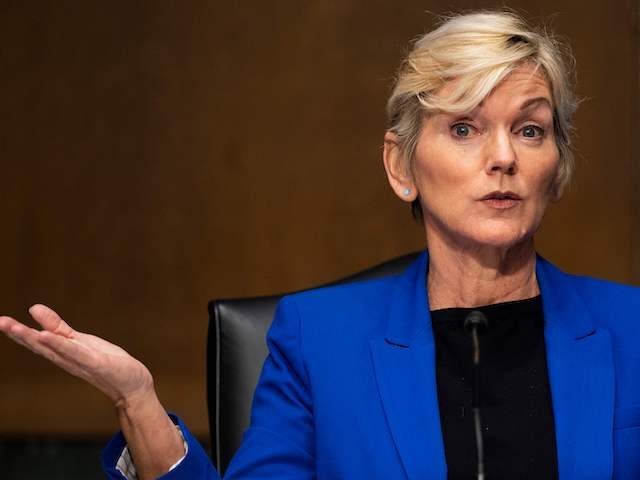Rep. Ted Budd (R-NC) is sending a letter to Department of Energy (DOE) Secretary Jennifer Granholm to press her for answers about how the DOE allowed China to usurp revolutionary battery technology created in the U.S.
“This development is highly alarming, and your department has a responsibility to provide Congress and the public with answers to important questions,” Budd said in the letter obtained exclusively by Breitbart News before its sending on Wednesday.
Budd refers to an August 9, 2022 National Public Radio (NPR) report which “laid out, in detail, how the DOE wrongfully allowed the transfer of advanced, cutting-edge battery technology developed in a federally-sponsored laboratory to a Chinese company.”
Budd details how researchers at the Pacific Northwest National lab began working on a vanadium redox flow battery in 2006 — the battery was envisioned to have a large storage capacity and the prototype was able to power an entire house. After six years and $15 million spent in taxpayer dollars toward research, a company called UniEnergy Technologies was founded in 2012 to license the DOE’s battery patent and market the technology commercially.
But after awhile, the company “began fostering progressively closer ties with Chinese entities” and eventually sub-licensed the DOE-owned patent to Rongke Power, a Chinese Firm. Even though U.S. law requires license holders of DOE patents to “substantially manufacture and predominantly sell the products in the U.S.” UniEnergy and Rongke Power mostly sold Chinese assembled batteries in China, Budd writes.
“DOE’s license monitoring apparatus failed to identify and investigate the non-compliant sublicence given to Rongke Power for years,” Budd states.
“Later in 2021, UniEnergy contacted the DOE to fully divest themselves of the vanadium redox flow battery license, requesting permission to transfer it to the Dutch based firm Vanadis Power,” he continued. “Even though that company does not substantially manufacture batteries within the U.S. for sale in the U.S. market—Vanadis’s website makes clear that they plan to manufacture their batteries in China—DOE officials apparently approved the transfer expeditiously.”
Budd emphasizes that China recently connected the world’s largest battery farm to its power grid — and all of the batteries in the 800MWh facility are Vanadis Power and Rongke Power vanadium redox flow batteries.
“Thus, it is clear this battery farm would not exist without U.S. taxpayer-funded research. It is unacceptable that DOE-funded research facilitated China’s achievement of this strategic feat before America could build anything comparable,” Budd writes.
Budd asked Granholm to answer several questions by Oct. 15, 2022, including:
What is the DOE’s process for monitoring compliance by license holders with U.S. law and department regulations?
Is there special attention paid to license holders who foster close business relationships with Chinese entities?
How does DOE investigate its own oversight failures and what steps does it take to implement changes?
Is DOE aware of other research conducted in national laboratories being licensed or sublicensed to Chinese entities and, if so, how can these technology transfers be stopped?
What steps can DOE take to hold license holders who violate the terms of their license accountable?
“Mistakes like allowing the scaling-up of cutting-edge, U.S. developed battery technology to occur in China instead of America cannot continue to occur. I expect your department to take concrete steps to prevent any further technology transfers to foreign adversaries,” he concludes.
China has a history of ending up with American technology — a 2021 CBS report estimated that the Chinese Communist Party has stolen $200 billion to $600 billion dollars a year in U.S. intellectual property for at least 20 years.

COMMENTS
Please let us know if you're having issues with commenting.